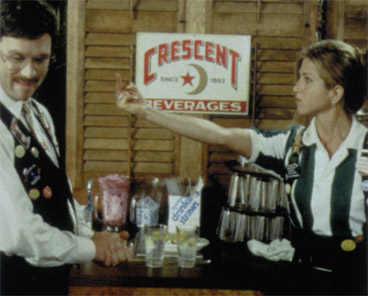
Big Bad Book Blog offers three rules to remember regarding superfluous stylistic flourishes for the aspiring author:
1. Less is more. Like loud fabrics, loud literary devices are hard to mix and match. If you’re going to narrate in stream-of-consciousness, do not also use screenplay-style stage directions and scene breaks. Pick the device that means the most to you. Once you’ve chosen your gimmick, don’t overdo it. Think of that guy you saw last weekend wearing all hot pink plaid. Did you say, “Wow, I admire his consistency to his theme”?
2. Make sure someone gets it. Kurt Vonnegut recommended writing with an audience of one in mind. Whoever you’re writing for, test it out. If your audience doesn’t like your device, you may want to consider toning it down. Even if you’re not thinking of a specific person as you compose, a suitably sympathetic, unbiased reader ought to be able to get through the device without trouble. I’m thinking your editor here.
3. Most important, make sure it’s crucial and authentic to the work, not just something you’re doing to show off. Christopher Bachelder’s Bear v. Shark uses stream-of-consciousness narration with two-page chapters and commercial breaks as its main style—a highly disruptive format. But the book is a satire about a near future in which television screens have taken over all four walls of the room and no longer turn off, where advertising invades our thoughts and the attention span is a thing of the past. The method is the message—so Bachelder’s outré style doesn’t distract from his point. (Also, the book is short—the author doesn’t expect us to get through three hundred pages of this bizarre prose.) If your device isn’t integral to your work, you’re probably better off without it.
To read the whole kit-n-kaboodle, click here.
Tuesday, December 2, 2008
Tuesday's Tip for Flailing Writers:
Inappropriate Flair
Posted by
Inkwell Bookstore
at
11:01 AM
![]()



